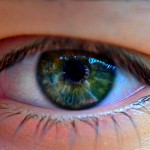Iris Scanners: A Medical Assistant’s Best Friend?

It sounds like something you’d see alongside flying cars and tube transportation on The Jetsons, but iris scanning could be coming to a doctor’s office near you sooner than you’d think. Why is this noteworthy for medical assistants? Well, one of the primary tasks that medical assistants perform every day is maintaining patient records, and iris scanning could become one of the biggest advances in medical records technology since records started moving from paper copies to computers.
One place where iris scanning is already in place is Novant Health Presbyterian Medical Center in Charlotte, North Carolina. Introduced just a few months ago, the system needs only to scan a patient’s eyes to pull up their record. It works like this: patients get an initial closeup photo of their eyes taken that captures the pattern of their iris, which is as unique as a fingerprint. This photo becomes a part of the patient’s medical record, so whenever they return for an appointment, a quick eye scan detects the iris pattern and immediately pulls up the appropriate record.
The benefits of such a system are numerous:
- It saves medical assistants and other front desk workers the time and effort of locating patient records.
- It increases the accuracy of pulling records, reducing the possibility of medical personnel accidentally mixing up patient information — which can be a distinct possibility when multiple patients have the same birth date or similar names.
- It reduces the required documentation that patients have to bring with them to prove their identities, such as driver’s licenses and insurance cards.
- In emergency situations where a patient is unconscious and without any identification, it makes it significantly easier to figure out who they are.
- Finally, it helps prevent medical identity theft, through which criminals can use your name or health insurance numbers to obtain prescription drugs and to receive medical care while the victim is left holding the bill. As Veronica Rose, a registrar at Novant, explains, “Someone can steal a driver’s license or a social security number, but they can’t get your eyes.”
The Novant network of medical centers plans to roll out 150 of the iris scanning cameras in locations throughout the Southeast. They chose this technology over a similar system used in the nearby Carolinas HealthCare System that reads a unique vein in people’s palms because unlike the palm reader, the eye scanner doesn’t require patients to come into contact with the equipment, and it doesn’t require patients to provide a second piece of information, such as date of birth, once they’re in the system.
While iris scanners are primarily located in hospitals at the present time, with successful expansion and mainstream acceptance, it’s not hard to envision a time when private doctors’ offices adopt the technology as well. In the meantime, keep an “eye” out for this new technology on the horizon.
(Sources: Charlotte Observer, Federal Trade Commission)







